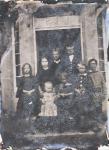Weather
Statistically in Britain we have climate but what we have to endure is weather. Barometrical records kept for many years at Sunlaws and Crailing House prove that Eckford is in the driest belt in Scotland.
Records and diaries show that there was some remarkable weather during the last century. The great frost of 1895 could be remembered by some in 1967! A Mr Collie Smith of Ormiston skated down the Teviot to Kelso Market, but there were hard frosts - ‘fine ringing frosts’ - and deep snow many times. April 28th, 1876 was said to be like a day in winter and in 1882 the ink-wells were frozen in the school desks. The winter of 1878-79 seems to have been one of the worst, starting with severe cold in early December and frost and snow still prevailing at the end of March.
Nearer in time are remembered the gales of March, 1927 which felled about 50 acres of the Bowmont Forest. There were floods in August 1948. In 1963 there was a return of the Arctic conditions of 1878-79 when following early snow in November there was a heavy fall on Boxing Day followed by others in close succession with flying winds and much drifting.
Eckford was cut off from the outside world at one time, all roads being blocked. Wooden Loch was frozen over and skating and ice hockey became the current pastimes. Skiers were out on Wooden Hill, a Land Rover being a do-it-yourself ski lift. The countryside lay under a white pall from December 26th until March 4th when the thaw came with startling suddenness. The melting snow could not soak through the hard ground and the floods were severe.
In contrast to the years of snow and flood came 1959 and its devastating drought. The sky was scanned daily for clouds which might bring relief but they always seemed to veer southwards. Permission has been given by Mr. Buist of Kirkbank to reprint his poem which so crystallises this time:
Garden , September 1959
The brown, baked desert lawn,
Summer brutally triumphant,
At cost of fainting earth:
Now and then a single birch leaf
Or, when the wind is wanton,
Flurry of dried leaves,
Shreds down to match
The brown, baked earth:
Elsewhere no flower, no other colours
But of two fuchsia bushes
By the front door,
Last precious storehouse
For brown, tumbling bees,
Who know, this parching summer,
A slender wage for labour.
The winter of 1982/83 was also severe. On the night of January 16th 1993 there was one of the worst gales in living memory when many trees blew down, especially in the Bowmont Forest and buildings were damaged.
